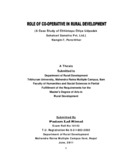Please use this identifier to cite or link to this item:
https://elibrary.tucl.edu.np/handle/123456789/3535| Title: | Role of Co-operative in Rural Development (A Case Study of Chhintapu Chiya Udpadak Sahakari Sanstha Pvt. Ltd.) |
| Authors: | Rimal, Padam Lal |
| Keywords: | Cooperatives;Rural development |
| Issue Date: | 2011 |
| Publisher: | Department of Rural Development |
| Institute Name: | Mahendra Ratna Multiple Campus, Ilam |
| Level: | Masters |
| Abstract: | This dissertation is prepared to partial fulfillment of the requirement for the Master's Degree of Arts in Rural Development. The importance of cooperative program is increasing day by day as a basis of rural development. Cooperative institutions are increasing in rural area. This study will help to determine the role of cooperative in rural development. It provides basis information and general guideline to the local people, planner, policymaker and other concerned agencies about the cooperative development. The formal concept of cooperative was developed from England and Germany in 1844 AD. In Nepal there was basic concept of co-operative activities as 'Parma', Guthi, Dharma and Dhikuti etc. The Dhikuti program at Thak-Khola in Mustang district was basis of co-operative concept in Nepal. The first co- operative institution was established at Bakhanpur VDC (now Sarada Town) in Chitwan district in 2013 BS. The main objective of that institution was resettlement to flood affected people in related area. Now it is estimates that there are 442 million members of cooperatives in Asia, and 700 million members worldwide in 100 countries. The general objective of this thesis is to find out the role of cooperative in rural development process. The specific objectives of the study are to analyze the socio-economic impact of cooperative, to finds out the potential activities and examine the role of cooperative in Rural Development process. This study concentrates to the Chhintapu Chiya Udpadak Sahakari Sanstha of Nangin VDC, ward No 7 and 8 only. The cooperative members (people) are selected only in ward No 7 and 8 of this VDC. The actual households (50 households), only 50 percents households (25 households) were taken in to consideration with equal ratio of the wards. The respondents from different occupation and age group were chosen by using purposive sampling. Basically this study depends upon the primary data collected from the field study. Structured questionnaire, field observation, personal interviews and focus group discussion were the tools used for this purpose. Most of the facts, events, record and data were based on comparative study between two time period (before and after the establishment of CCUSS) in the study area. There were 20 percent houses were improved in to muddy types, about 8 percent households were increase in modern agriculture sectors, about 20 percent households were increase in plastic pipe user for drinking water, the number of modern toilet user households were increase about 28 percent and the households in tea farming were also increase about 12 percent after the establishment of CCUSS in the study area. It was find out that the Chhintapu Chiya Udpadak Cooperative Institution improved in sanitation through support to member in making toilet and drinking water management as financially and technically in the study area. It was also support in agriculture modernization through giving training and modern seeds distribution. There were occurred positive changes in fuel and electricity consumption sectors. About 80 percent members were used solar system in the study area. It has positive impact on health and education sectors. Modern tea farming and organic hand tea production is also increasing in the study area with the help of cooperative. Animal husbandry also is in beneficial condition than the past. Cooperative is supporting to the farmer as financial and coordination with other institutions in the fields of animal husbandry sectors. The positive social awareness is also mentionable sectors of cooperative role in the study area. The saving and loan facility is also important role of cooperative in the study area. People can save their little amount of money and invest on productive sectors with the help of cooperative. The chip rate of interest is also positive role of cooperative in the study area. It can play the role on poverty reduction in rural area. It is also developed the concept of unity and apply it with new vision and modern idea in different productive sectors. Milk production and distribution, transportation, small cottage industry, education, agriculture development, village tourism, women empowerment, encourage the marginalize people, employment and production of small hydropower and are the most resent sectors of supporting through cooperative in rural area, Finally, the co-operative institution plays the vital role in rural development. Rural people can improved their socio-economic, educational sectors and life standard through the cooperation with the help of cooperative practices. In the prospective of Nepal there are not any financial facilities in rural sectors. The cooperative institution can support to rural people as small banking system. |
| URI: | http://elibrary.tucl.edu.np/handle/123456789/3535 |
| Appears in Collections: | Rural Development |
Files in This Item:
| File | Description | Size | Format | |
|---|---|---|---|---|
| My Thesis Final.pdf | 473.79 kB | Adobe PDF |  View/Open |
Items in DSpace are protected by copyright, with all rights reserved, unless otherwise indicated.
